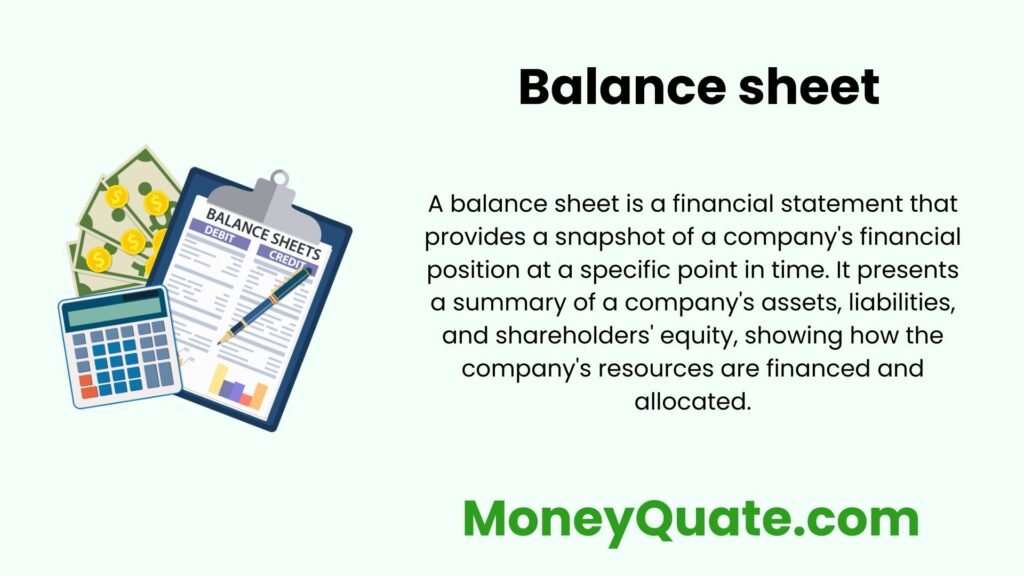The balance sheet, also known as the statement of financial position, is a fundamental financial statement that provides a detailed snapshot of a company’s financial condition at a specific point in time. It outlines the company’s assets, liabilities, and shareholders’ equity, offering crucial insights into its financial health and stability.

Contents
Components of the Balance Sheet
Assets
Assets represent resources owned or controlled by the company that have economic value and are expected to provide future benefits. They are typically categorized into two main groups:
- Current Assets: Assets expected to be converted into cash or used up within one year, including cash, accounts receivable, inventory, and short-term investments.
- Non-Current Assets: Long-term assets with a useful life extending beyond one year, such as property, plant, equipment, intangible assets, and long-term investments.
Liabilities
Liabilities are obligations or debts owed by the company to external parties, representing claims against the company’s assets. Similar to assets, liabilities are divided into two primary categories:
- Current Liabilities: Debts and obligations expected to be settled within one year, including accounts payable, short-term loans, accrued expenses, and current portion of long-term debt.
- Non-Current Liabilities: Long-term obligations extending beyond one year, such as long-term debt, deferred tax liabilities, pension liabilities, and lease obligations.
Shareholders’ equity, also known as net worth or book value, represents the residual interest in the company’s assets after deducting its liabilities. It includes:
- Common Stock: The total par value or nominal value of shares issued by the company.
- Additional Paid-in Capital: Amounts received from investors in excess of the par value of common stock.
- Retained Earnings: Cumulative profits or losses retained by the company after dividends have been paid to shareholders.
- Accumulated Other Comprehensive Income: Unrealized gains or losses from items such as foreign currency translation adjustments and unrealized gains or losses on available-for-sale securities.
Importance of the Balance Sheet
- Financial Position: The balance sheet provides stakeholders with a clear understanding of the company’s financial position, including its liquidity, solvency, and overall financial strength.
- Investor Decision-Making: Investors use the balance sheet to assess the company’s ability to generate future profits, manage its debt obligations, and create shareholder value.
- Creditor Analysis: Creditors evaluate the balance sheet to determine the company’s creditworthiness and ability to repay debts, influencing decisions regarding lending and financing.
- Strategic Planning: Management utilizes the balance sheet to make strategic decisions, such as allocating resources, raising capital, and planning for future growth initiatives.
Analyzing the Balance Sheet
- Ratio Analysis: Financial ratios derived from the balance sheet, such as liquidity ratios (e.g., current ratio, quick ratio), leverage ratios (e.g., debt-to-equity ratio), and efficiency ratios (e.g., asset turnover ratio), provide insights into various aspects of the company’s financial performance and risk profile.
- Comparative Analysis: Comparing the company’s balance sheet with those of its peers and industry benchmarks helps identify strengths, weaknesses, and areas for improvement.
- Trend Analysis: Examining changes in the balance sheet over multiple periods reveals trends in asset composition, debt levels, equity positions, and overall financial performance.
Conclusion
The balance sheet serves as a cornerstone of financial reporting, providing a comprehensive overview of a company’s financial position and performance. By analyzing the balance sheet, stakeholders can make informed decisions, assess financial risks, and gain insights into the company’s operational efficiency and strategic direction.
2 thoughts on “What do you mean by balance sheet? Components and Importance”